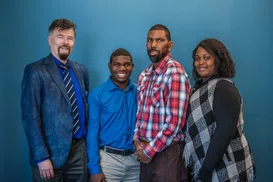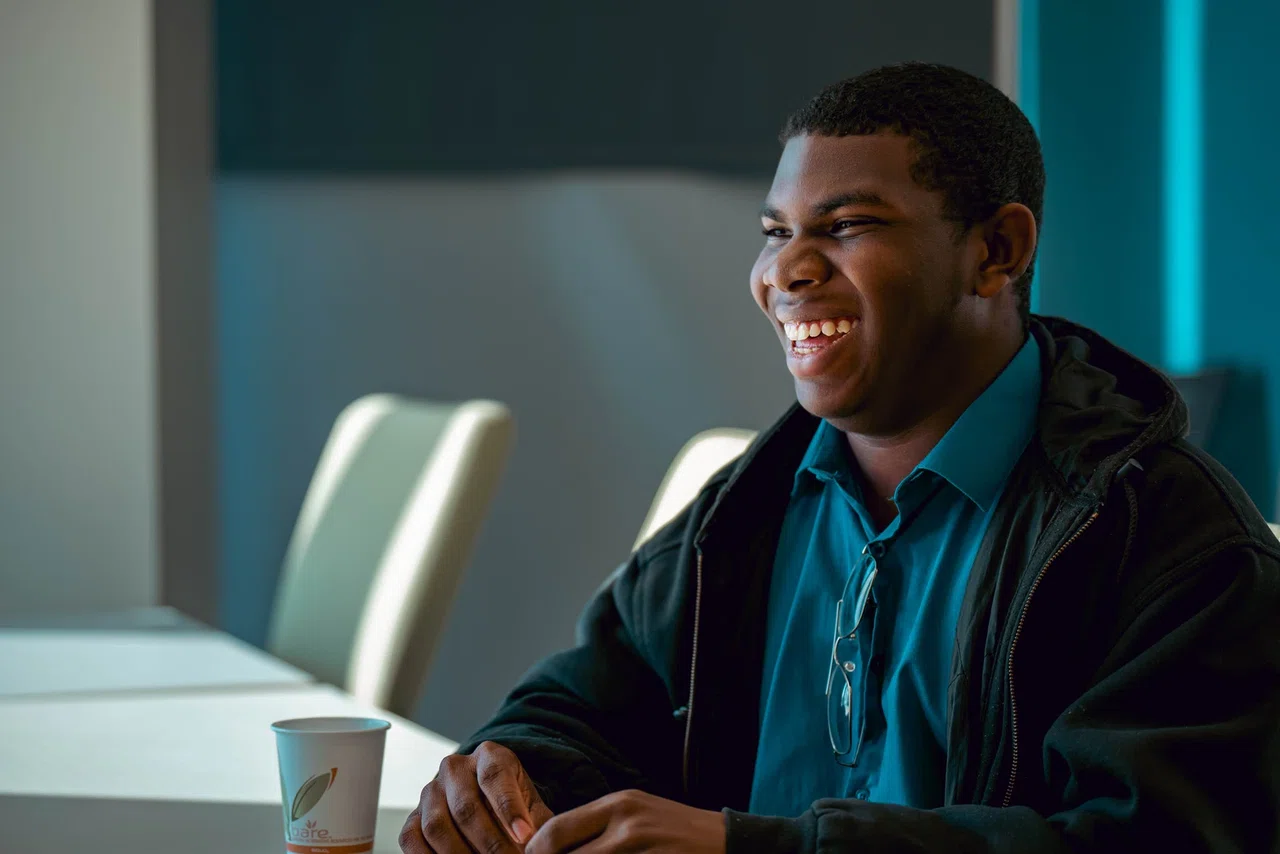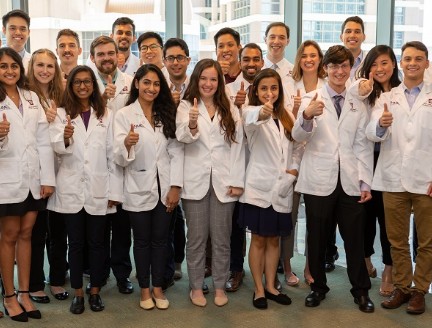


Innovative Education
Dr. Cooke and
The Wunderkind
Dr. Cooke and
The Wunderkind
Mentoring a New Generation
of the Best and Brightest
Mentoring a New Generation
of the Best and Brightest

When asked what Nehemiah Juniel was like as a kid, his mother replied, “he was just like this, but smaller.”
“He was always inquisitive,” his mother Corie Juniel said. His father, Raphael, agreed, “We always encouraged him to seek out the answers first on his own and that if he wanted further understanding we are always here to help him find the answers.”
In fact, his inquisitiveness earned the moniker, "professor” because whenever he would meet someone, he would always pose the question, “Did you know?”
At three years of age, Nehemiah was reading the Bible and he self-diagnosed himself with vertigo at five years old. To the physician’s surprise, Nehemiah’s diagnosis was spot-on.
His parents recognized early on that Nehemiah was special and that traditional brick and mortar schools was not best option. “He was solving algebra problems in kindergarten,” said Corie. “We weren’t prepared for the mind that Nehemiah possesses.”

She and her husband agreed that homeschooling was the best solution. While Raphael was on active military duty, Corie laid the groundwork for Nehemiah and his six siblings’ education. Raphael focused on tutoring Nehemiah in mathematics, science and history while Corie tutored him in writing and English.
His Future Self
When Nehemiah was about eight years old, he penned a letter to his future self. “I wrote was that I was going to cure cancer, be the best doctor ever, and make sure that health care is free for everyone.”
Five years later, his “future self” earned an associate of arts degree from Lone Star College at 13. Two years later, he made history at Sam Houston State University as the youngest graduate at the age of 15 (just shy of his 16th birthday), when he earned a Bachelor of Science in Health Sciences. By the way, the Juniel family genes are genius producing. Nehemiah’s older sister also started college at 13.
With plans of attending medical school “I was trying to graduate very quickly,” said the now 17-year-old.
“The level of courses I was taking were focused more on community health than the science side.” Being on an actual school campus was a big change, “I felt like I belonged because I was there with people who were on the same educational level as me.”
Nehemiah and his parents believed that an internship would be great option for Nehemiah to gain firsthand experience in preparation for the next leg of his academic journey in earning a masters and a PhD.

His Future Self
When Nehemiah was about eight years old, he penned a letter to his future self. “I wrote was that I was going to cure cancer, be the best doctor ever, and make sure that health care is free for everyone.”
Five years later, his “future self” earned an associate of arts degree from Lone Star College at 13. Two years later, he made history at Sam Houston State University as the youngest graduate at the age of 15 (just shy of his 16th birthday), when he earned a Bachelor of Science in Health Sciences. By the way, the Juniel family genes are genius producing. Nehemiah’s older sister also started college at 13.
With plans of attending medical school “I was trying to graduate very quickly,” said the now 17-year-old.
“The level of courses I was taking were focused more on community health than the science side.” Being on an actual school campus was a big change, “I felt like I belonged because I was there with people who were on the same educational level as me.”
Nehemiah and his parents believed that an internship would be great option for Nehemiah to gain firsthand experience in preparation for the next leg of his academic journey in earning a masters and a PhD.
The Meeting,
The Fellowship,
The Mentor
Enter John P. Cooke, MD, PhD.
Thanks to his wife, Anita, Cooke learned about Nehemiah’s history-making story of graduating from Sam Houston at 15.
“I thought it was remarkable,” Cooke said. “The fact that he aspired to be a cardiologist at seven years old; I thought, I had to meet this kid.” Cooke is the Joseph C. “Rusty” Walter and Carole Walter Looke Presidential Distinguished Chair in Cardiovascular Disease Research, Department of Cardiovascular Sciences; Chair of the Department of Cardiovascular Sciences, Director of the Center for Cardiovascular Regeneration; and Medical Director of the Center for RNA Therapeutics
He reached out to his parents and arranged a visit. Admittedly, Cooke had multiple reasons he was interested in Nehemiah. “The Department of Cardiovascular Sciences is always looking for bright students,” said Cooke, who directed a training program for scientists for 20 years at Stanford University.
One of the things that Nehemiah is already doing better than I did at his age is to seek mentorship. When I was at his stage of development, I thought I could do it all myself.
John P. Cooke, MD, PhD
Another reason he was especially interested in Nehemiah was because “something struck a chord with me about his story. I grew up in a blue-collar neighborhood on the east of Detroit,” the Professor of Cardiovascular Sciences shared. “My father came to this country from Ireland (Gaeltacht) only speaking Gaelic. But he worked hard at Ford Motor and sent all six of his kids to college.”
Also, “Nehemiah’s story was similar to mine,” he remembered. “I was different from most of the kids I grew up with. Science always fascinated me at an early age, particularly biology.”
Nehemiah was offered a fellowship opportunity at the Houston Methodist Research Institute to work with Cooke’s Cardiovascular Sciences team. During his fellowship Nehemiah learned about cellular senescence (a phenomenon characterized by the cessation of cell division also known as cellular aging) with western blotting (process of detecting abnormal proteins).
As a teaching-learning moment, Cooke asked Nehemiah to offer an example of senescence. “Cancer is a particularly special disease because the cells do not stop replicating their damage,” Nehemiah said. ”There is nothing within the cell to tell it to stop. So, the cancer is allowed to spread, grow and infect other cells,” Nehemiah said.
“Another characteristic of senescence is that these cells make inflammatory molecules and proteins, and make all the cells around them sick,” added Cooke. “However, senescence has a role in the body; senescence is not a bad thing when cancer cells need to be senescent to actually die.”
“We believe that aging, or senescence, is involved in a lot of other diseases,” he noted. “In fact, most diseases are due to the aging process. We are understanding and learning that some of these processes can be reversed.” Cooke’s lab has successfully reversed one, known as telomere erosion, which results in doubling the lifespan of human cells.
During his fellowship, Nehemiah recently earned a Master of Molecular Medicine from Liberty University. Why Molecular Medicine? “It takes the scientific viewpoint, the cellular level below and applies that to diseases and common illnesses that we see today and explains the link between them.”
While working with Cooke and the team, Nehemiah made a personal discovery that provided a greater perspective for his future in medicine.
Nehemiah said, “What I like the most about research is that you can take the concepts you’ve learned about throughout the rest of your education and apply them is so many new ways.” For example, he learned that some proteins have an interesting effect on the body and its organs. “By manipulating these proteins, you can change the function of the cells by the way they are linked to different diseases.”
In Cooke’s lab they are researching telomere, aging and healing. “They are looking at ways of how they can manipulate the cells to fix the problem,” Nehemiah said. With hopes of continuing to work with Cooke’s team, Nehemiah aspires to attend Texas A&M University for a PhD in Biomedical Sciences.
Sheryl E. Taylor
April 2024
Cathedral of Wisdom
When asked what advice he would give to Nehemiah’s present and future self?
“One of the things that Nehemiah is already doing better than I did at his age is to seek mentorship. When I was at his stage of development, I thought I could do it all myself,” Cooke recalled. “You need help. You cannot do it all by yourself. You are stronger with others. The more mentors you have, the better. You will be stronger with that kind of network.”
Cooke added, “I can’t wait to meet Nehemiah’s future self. His gifts exceed the requirement for being a good doctor. I sincerely believe that Nehemiah can be a physician-scientist who develops innovative technology and generates new fundamental insights into the nature of healing to make us all better doctors.
“We’re building this beautiful cathedral of wisdom gaining the knowledge in the laboratory is useful to humanity.”
Related Articles








